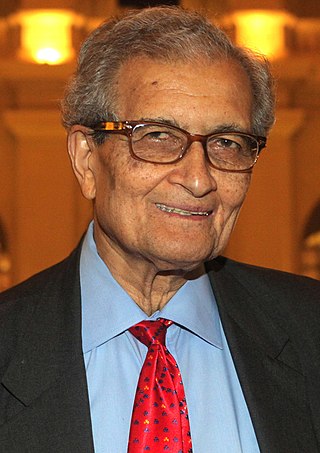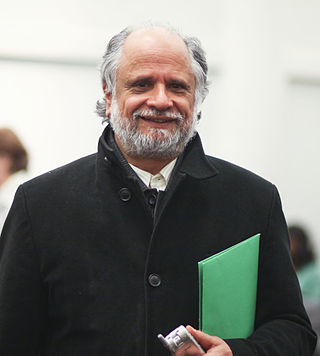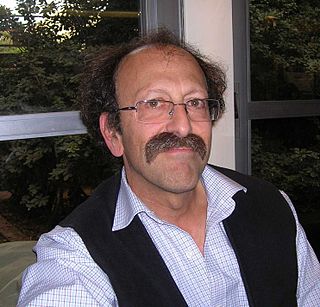
Religion is a range of social-cultural systems, including designated behaviors and practices, morals, beliefs, worldviews, texts, sanctified places, prophecies, ethics, or organizations, that generally relate humanity to supernatural, transcendental, and spiritual elements—although there is no scholarly consensus over what precisely constitutes a religion. Different religions may or may not contain various elements ranging from the divine, sacredness, faith, and a supernatural being or beings.

Amartya Kumar Sen is an Indian economist and philosopher, who since 1972 has taught and worked in the United Kingdom and the United States. Sen has made contributions to welfare economics, social choice theory, economic and social justice, economic theories of famines, decision theory, development economics, public health, and measures of well-being of countries.

Charles Margrave Taylor is a Canadian philosopher from Montreal, Quebec, and professor emeritus at McGill University best known for his contributions to political philosophy, the philosophy of social science, the history of philosophy, and intellectual history. His work has earned him the Kyoto Prize, the Templeton Prize, the Berggruen Prize for Philosophy, and the John W. Kluge Prize.

In religious studies, an ethnic religion is a religion or belief associated with a particular ethnic group. Ethnic religions are often distinguished from universal religions, such as Christianity or Islam, in which gaining converts is a primary objective and, therefore, are not limited in ethnic, national or racial scope.
Religion in the United States is widespread, diverse, and vibrant, with the country being far more religious than other wealthy Western nations. An overwhelming majority of Americans believe in a higher power, engage in spiritual practices, and consider themselves religious or spiritual. Christianity is the most widely professed religion, with most Americans being Evangelicals, Mainline Protestants, or Catholics.

Homi Kharshedji Bhabha is an Indian-British scholar and critical theorist. He is the Anne F. Rothenberg Professor of the Humanities at Harvard University. He is one of the most important figures in contemporary postcolonial studies, and has developed a number of the field's neologisms and key concepts, such as hybridity, mimicry, difference, and ambivalence. Such terms describe ways in which colonised people have resisted the power of the coloniser, according to Bhabha's theory. In 2012, he received the Padma Bhushan award in the field of literature and education from the Indian government. He is married to attorney and Harvard lecturer Jacqueline Bhabha, and they have three children.
Moral nihilism is the meta-ethical view that nothing is morally right or morally wrong and that morality doesn't exist.

Manindra Agrawal is an Indian computer scientist and professor at the Department of Computer Science and Engineering at the Indian Institute of Technology, Kanpur. He was the recipient of the first Infosys Prize for Mathematics, the Godel Prize in 2006; and the Shanti Swarup Bhatnagar Award in Mathematical Sciences in 2003. He has been honoured with Padma Shri, India's 4th highest civilian award, in 2013.

Jonathan Edward Schell was an American author and visiting fellow at Yale University, whose work primarily dealt with campaigning against nuclear weapons.
Abdullahi Ahmed An-Na'im is a Sudanese-born Islamic scholar who lives in the United States and teaches at Emory University. He is the Charles Howard Candler Professor of Law at Emory University School of Law, associated professor in the Emory College of Arts and Sciences, and Senior Fellow of the Center for the Study of Law and Religion of Emory University.
Diana L. Eck is a scholar of religious studies who is Professor of Comparative Religion and Indian Studies at Harvard University, as well as a former faculty dean of Lowell House and the Director of The Pluralism Project at Harvard. Among other works, she is the author of Banaras, City of Light, Darsan: Seeing the Divine Image in India, Encountering God: A Spiritual Journey from Bozeman to Banaras, A New Religious America: How a Christian Country Became the World's Most Religiously Diverse Nation, and "India: A Sacred Geography." At Harvard, she is in the Department of South Asian Studies, the Committee on the Study of Religion, and is also a member of the Faculty of Divinity. She has been the chair for the Committee on the Study of Religion. She also served on the Humanities jury for the Infosys Prize in 2019.

Amit Chaudhuri is a novelist, poet, essayist, literary critic, editor, singer, and music composer from India.

Pratap Bhanu Mehta is an Indian academician. He was the president of the Centre for Policy Research, a New Delhi-based think tank and was the Vice-Chancellor of Ashoka University from July 2017 to July 2019.

John Kuriyan is the dean of basic sciences and a professor of biochemistry at Vanderbilt University School of Medicine. He was formerly the Chancellor's Professor at the University of California, Berkeley in the departments of molecular and cell biology (MCB) and chemistry, a faculty scientist in Berkeley Lab's physical biosciences division, and a Howard Hughes Medical Institute investigator. He is a member of the National Academy of Sciences and he has also been on the Life Sciences jury for the Infosys Prize in 2009, 2019 and 2020.

Sanjay Subrahmanyam is an Indian historian who specialises in the early modern period and in connected history. He is the author of several books and publications. He holds the Irving and Jean Stone Endowed Chair in Social Sciences at UCLA which he joined in 2004.

David Dean Shulman is an Israeli Indologist, poet and peace activist, known for his work on the history of religion in South India, Indian poetics, Tamil Islam, Dravidian linguistics, and Carnatic music. Bilingual in Hebrew and English, he has mastered Sanskrit, Tamil, Hindi, and Telugu, and reads Greek, Russian, French, German, Persian, Arabic and Malayalam. He was formerly Professor of Indian Studies and Comparative Religion at the Hebrew University, Jerusalem, and professor in the now defunct Department of Indian, Iranian and Armenian Studies. Presently he holds a chair as Renee Lang Professor of Humanistic Studies at the Hebrew University in Jerusalem. He has been a member of the Israel Academy of Sciences and Humanities since 1988.

The Infosys Prize is an annual award given to scientists, researchers, engineers and social scientists of Indian origin by the Infosys Science Foundation and ranks among the highest monetary awards in India to recognize research. The prize for each category includes a gold medallion, a citation certificate, and prize money of US$100,000. The prize purse is tax free in the hands of winners in India. The winners are selected by the jury of their respective categories, headed by the jury chairs.

Nadarajan "Raj" Chetty is an Indian-American economist and the William A. Ackman Professor of Public Economics at Harvard University. Some of Chetty's recent papers have studied equality of opportunity in the United States and the long-term impact of teachers on students' performance. Offered tenure at the age of 28, Chetty became one of the youngest tenured faculty in the history of Harvard's economics department. He is a recipient of the John Bates Clark Medal and a 2012 MacArthur Fellow. Currently, he is also an advisory editor of the Journal of Public Economics. In 2020, he was awarded the Infosys Prize in Economics, the highest monetary award recognizing achievements in science and research, in India.
Daniel L. Overmyer was a Canadian historian of religion and academic who was Professor Emeritus in the Department of Asian Studies and the Centre for Chinese Research at the University of British Columbia. Overmyer was a pioneer in the study of Chinese popular thought, religion, and culture; popular religious sects of the late traditional and modern periods and their texts; and local rituals and beliefs practiced in villages, especially North China.
Robert Boyers is an American literary essayist, cultural critic and memoirist. Currently, he is the editor of the quarterly magazine Salmagundi, Professor of English at Skidmore College, and Director of the New York State Summer Writers Institute, which he founded in 1987.













